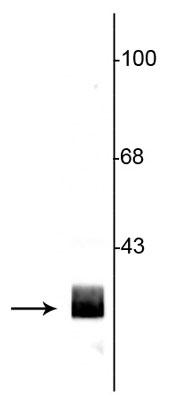Anti-14-3-3 Protein Antibody
Our Anti-14-3-3 Protein rabbit polyclonal primary antibody from PhosphoSolutions is produced in-hous
- 产品详情
- 实验流程
- 背景知识
Application
| WB |
|---|---|
| Primary Accession | P35213 |
| Reactivity | Rat |
| Host | Rabbit |
| Clonality | Polyclonal |
| Isotype | IgG |
| Calculated MW | 28054 Da |
| Gene ID | 56011 |
|---|---|
| Other Names | 14 3 3 antibody, 14 3 3 protein beta antibody, 14 3 3 protein beta/alpha antibody, 14 3 3 protein zeta antibody , 14 3 3 zeta antibody, 14-3-3 protein beta/alpha antibody, 14-3-3 protein/cytosolic phospholipase A2 antibody, 1433B_HUMAN antibody, GW128 antibody, HS1 antibody, KCIP 1 antibody, KCIP-1 antibody, MGC111427 antibody, MGC126532 antibody, MGC138156 antibody, N-terminally processed antibody, Protein 1054 antibody, Protein kinase C inhibitor protein 1 antibody, Tyrosine 3-monooxygenase/tryptophan 5-monooxygenase activation protein delta polypeptide antibody, Tyrosine 3/tryptophan 5 -monooxygenase activation protein zeta polypeptide antibody, YWHAB antibody, YWHAD antibody, YWHAZ antibody |
| Target/Specificity | 14-3-3 proteins are a family of highly conserved proteins that appear to have multiple roles in cell signaling (Bridges and Moorhead, 2005). The proteins are abundantly expressed in the brain and have been detected in the cerebrospinal fluid of patients with different neurological disorders (Berg et al., 2003). 14-3-3 proteins bind protein ligands that are typically phosphorylated on serine or threonine residues and regulate the functions of these binding partners by a number of different mechanisms (Silhan et al., 2004; Dougherty and Morrison, 2004). The 14-3-3 proteins affect a diverse array of cellular processes including the cell cycle and transcription, signal transduction and intracellular trafficking. |
| Dilution | WB~~1:1000 |
| Format | Antigen Affinity Purified from Pooled Serum |
| Storage | Maintain refrigerated at 2-8°C for up to 6 months. For long term storage store at -20°C in small aliquots to prevent freeze-thaw cycles. |
| Precautions | Anti-14-3-3 Protein Antibody is for research use only and not for use in diagnostic or therapeutic procedures. |
| Shipping | Blue Ice |
For Research Use Only. Not For Use In Diagnostic Procedures.
Provided below are standard protocols that you may find useful for product applications.
BACKGROUND
14-3-3 proteins are a family of highly conserved proteins that appear to have multiple roles in cell signaling (Bridges and Moorhead, 2005). The proteins are abundantly expressed in the brain and have been detected in the cerebrospinal fluid of patients with different neurological disorders (Berg et al., 2003). 14-3-3 proteins bind protein ligands that are typically phosphorylated on serine or threonine residues and regulate the functions of these binding partners by a number of different mechanisms (Silhan et al., 2004; Dougherty and Morrison, 2004). The 14-3-3 proteins affect a diverse array of cellular processes including the cell cycle and transcription, signal transduction and intracellular trafficking.
终于等到您。ABCEPTA(百远生物)抗体产品。
点击下方“我要评价 ”按钮提交您的反馈信息,您的反馈和评价是我们最宝贵的财富之一,
我们将在1-3个工作日内处理您的反馈信息。
如有疑问,联系:0512-88856768 tech-china@abcepta.com.























 癌症的基本特征包括细胞增殖、血管生成、迁移、凋亡逃避机制和细胞永生等。找到癌症发生过程中这些通路的关键标记物和对应的抗体用于检测至关重要。
癌症的基本特征包括细胞增殖、血管生成、迁移、凋亡逃避机制和细胞永生等。找到癌症发生过程中这些通路的关键标记物和对应的抗体用于检测至关重要。 为您推荐一个泛素化位点预测神器——泛素化分析工具,可以为您的蛋白的泛素化位点作出预测和评分。
为您推荐一个泛素化位点预测神器——泛素化分析工具,可以为您的蛋白的泛素化位点作出预测和评分。 细胞自噬受体图形绘图工具为你的蛋白的细胞受体结合位点作出预测和评分,识别结合到自噬通路中的蛋白是非常重要的,便于让我们理解自噬在正常生理、病理过程中的作用,如发育、细胞分化、神经退化性疾病、压力条件下、感染和癌症。
细胞自噬受体图形绘图工具为你的蛋白的细胞受体结合位点作出预测和评分,识别结合到自噬通路中的蛋白是非常重要的,便于让我们理解自噬在正常生理、病理过程中的作用,如发育、细胞分化、神经退化性疾病、压力条件下、感染和癌症。






